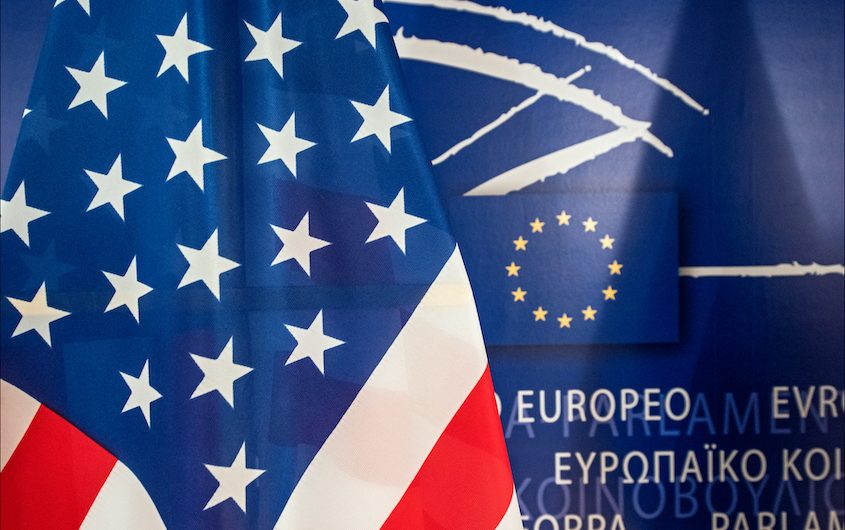
European Parliament via Flikr
Equity at Home and Security Abroad: Transatlantic Economic Cooperation after January 20

Peter S. Rashish
Vice President; Director, Geoeconomics Program
Peter S. Rashish, who counts over 30 years of experience counseling corporations, think tanks, foundations, and international organizations on transatlantic trade and economic strategy, is Vice President and Director of the Geoeconomics Program at AICGS. He also writes The Wider Atlantic blog.
Mr. Rashish has served as Vice President for Europe and Eurasia at the U.S. Chamber of Commerce, where he spearheaded the Chamber’s advocacy ahead of the launch of the Transatlantic Trade and Investment Partnership. Previously, Mr. Rashish was a Senior Advisor for Europe at McLarty Associates, Executive Vice President of the European Institute, and a staff member and consultant at the International Energy Agency, the World Bank, UN Trade and Development, the Atlantic Council, the Bertelsmann Foundation, and the German Marshall Fund.
Mr. Rashish has testified before the House Financial Services Subcommittee on International Monetary Policy and Trade and the House Foreign Affairs Subcommittee on Europe and Eurasia and has advised three U.S. presidential campaigns. He has been a featured speaker at the Munich Security Conference, the Aspen Ideas Festival, and the European Forum Alpbach and is a member of the Board of Directors of the Jean Monnet Institute in Paris and a Senior Advisor to the European Policy Centre in Brussels. His commentaries have been published in The New York Times, the Financial Times, The Wall Street Journal, Foreign Policy, and The National Interest, and he has appeared on PBS, CNBC, CNN, NPR, and the BBC.
He earned a BA from Harvard College and an MPhil in international relations from Oxford University. He speaks French, German, Italian, and Spanish.
For a short period in the mid-1950s, the modernizing politician Pierre Mendès France served as France’s Prime Minister. During his mere nine months in office, PMF, as he was known, brought the country out of the Indochina conflict and resolved the impasse over the European Defense Community. Almost as much as for his actions, Mendès France became famous for a phrase in his inaugural speech to the National Assembly: “gouverner, c’est choisir,” or “to govern is to choose.”
As the United States and the European Union forge a new basis for cooperation after four years of acrimony and neglect under President Trump, PMF’s dictum about the need to choose should be front and center. While the temptation to make up for lost time by going for a wide-ranging agenda is understandable, the U.S. and the EU should instead agree on a limited set of key priorities, but go deep on them.
The EU has already started this process. On December 2, the European Commission and the EU High Representative for Foreign and Security Policy put forward a joint communication for the approval of member states on “A new EU-US agenda for global change.” While not as ambitious as the New Transatlantic Agenda the U.S. and the EU agreed in 1995 at a moment of optimism about their relationship, it covers considerable ground.
With Americans concerned about their government’s ability to make the economy work for the middle class and to protect them from a rising China, a future transatlantic agenda needs to be sharply focused through a dual lens: fostering greater equity at home and advancing strategic interests abroad.
The EU’s proposal offers a promising basis for transatlantic cooperation. But with Americans concerned about their government’s ability to make the economy work for the middle class and to protect them from a rising China, a future transatlantic agenda needs to be sharply focused through a dual lens: fostering greater equity at home and advancing strategic interests abroad.
- Combating the coronavirus should be priority number one, including carrying out an inventory of supply chains for medical equipment and pharmaceuticals, reducing sole-supplier dependencies, and adopting new principles for their future resilience
- WTO reform—rebooting the dispute settlement system’s Appellate Body and agreeing to new rules on subsidies and state-owned enterprises—would create a more level playing field for transatlantic economic interests
- Ensuring the convergence of trade and climate goals, for example through a new WTO-consistent carbon border adjustment mechanism, would help high-standard manufacturing economies like the U.S. and the EU
- Common rules for AI would promote a human-centered vision of technology in line with U.S. and European values
While China may not be this agenda’s direct focus, progress in all these areas would help mitigate the effects of its economic behavior and promote a global economy that is a source of U.S. and European prosperity and wellbeing. Many of these issues can be addressed by a proposed “U.S.-EU Trade and Technology Council,” which the two sides should launch soon after President-elect Biden takes office. And while the idea of a U.S.-EU summit during the first half of 2021 is compelling, it would help build goodwill if the two sides could first make progress on one or more ongoing sources of tension, including U.S. steel and aluminum tariffs, EU digital services taxes, and the Boeing-Airbus subsidies dispute.
A final point: there is a harder edge to the EU’s language than in the past, framing the transatlantic agenda as one “centered on areas where our interests converge, our collective leverage can best be used….” That may confirm the EU’s increasingly realistic assessment that the rise of China requires it to embrace a more power-based approach. If so, that augurs well for what is to come after January 20, 2021.








